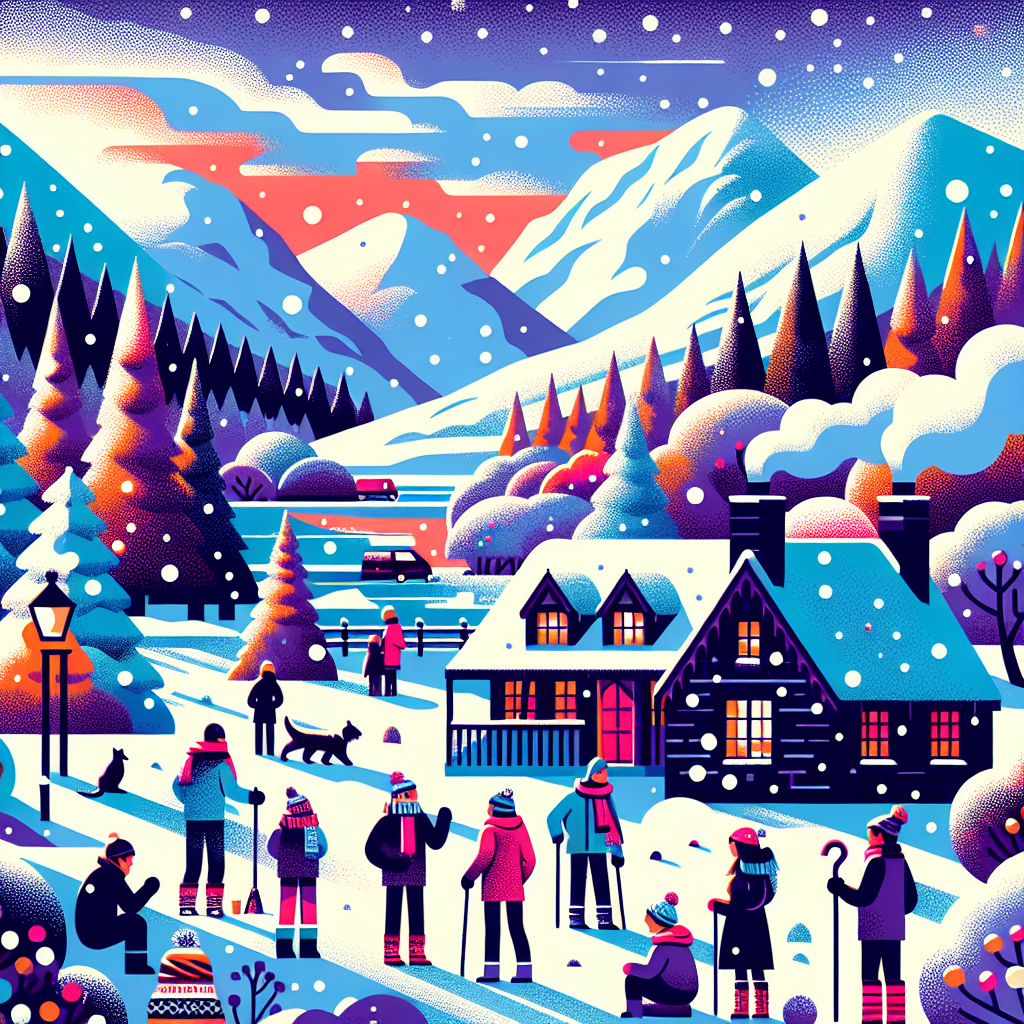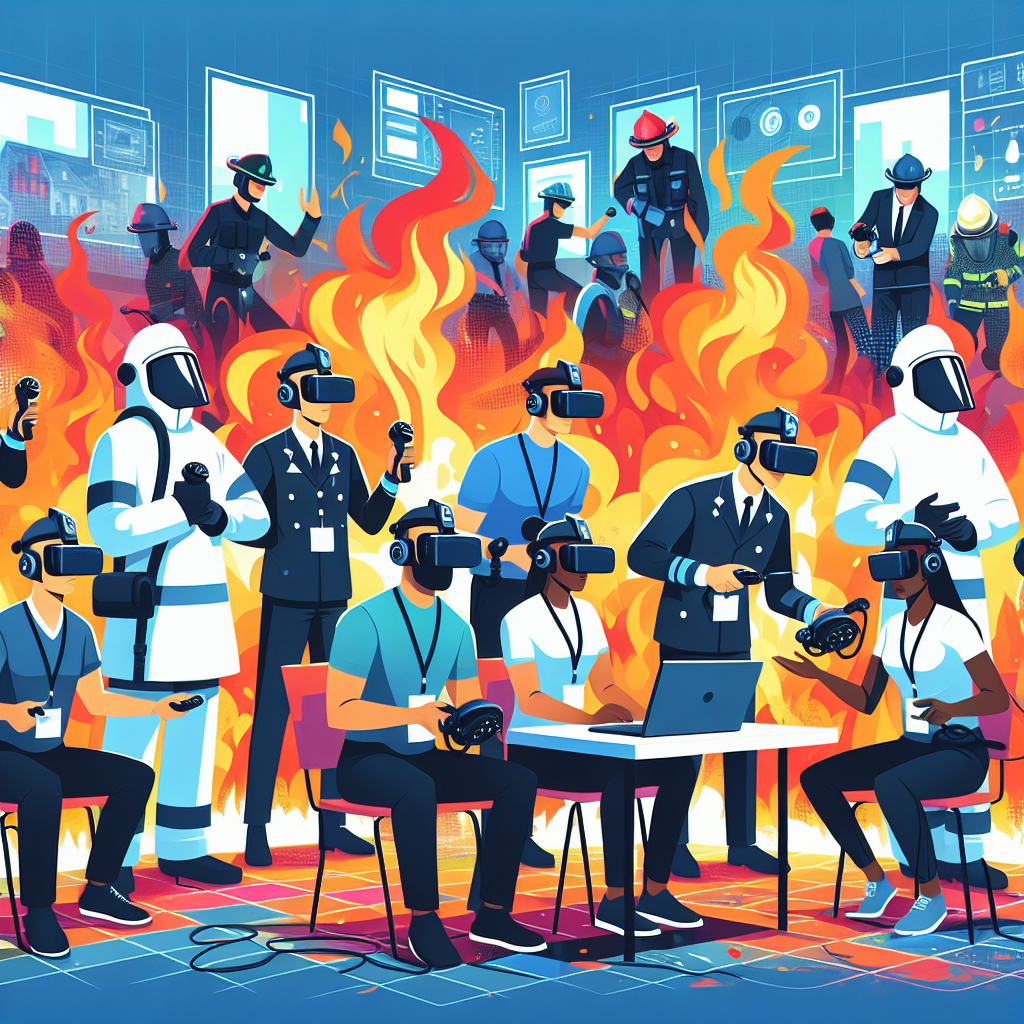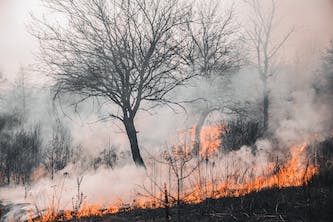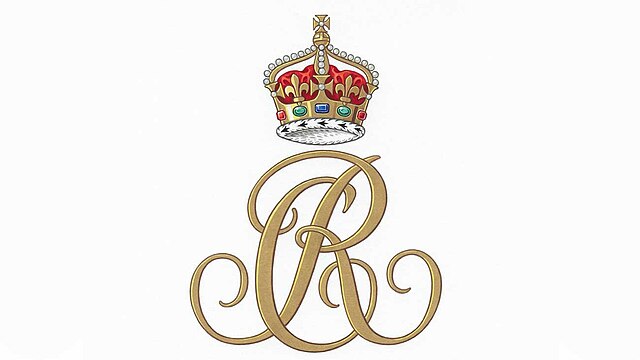Recently, the UK has experienced a big drop in temperatures due to a blast of cold air from the Arctic. This has caused frost and snow, especially in Scotland. The cold weather has made temperatures fall significantly overnight, and it looks like the weekend will be very chilly, with a chance of heavy snow and blizzard-like conditions. Health officials in England have issued amber alerts, warning that there could be health risks, especially for vulnerable people. They are advising everyone to stay indoors during the coldest parts of the day, especially in the early mornings when the frost is at its worst.
Weather warnings are in place for most of England, Wales, and Scotland from Saturday to Monday, with specific alerts for snow and ice. Northern Scotland has already seen some snowfall, creating beautiful winter scenes in the Highlands. This cold weather is a big change from the mild temperatures we had during the Christmas season, when it was between 11°C and 13°C. Now, temperatures are expected to be around 5°C lower than usual for January, and the wind chill will make it feel even colder.
The UK Health Security Agency (UKHSA) has sent out health alerts to warn healthcare providers about how the cold could affect people’s health. These alerts focus on protecting older people and those with existing health problems. Local NHS services are sharing tips on how to stay safe in this cold weather, urging everyone to avoid going outside during the early morning and late evening when conditions are most dangerous.
As this cold weather system moves in, rain is expected to change to snow, especially in southern England, before turning back to rain later in the evening. Areas like Wales and northern England could see significant snowfall, with up to 30 cm possible in higher places. This weather could cause travel problems and power outages, especially in rural areas that might get cut off due to heavy snow. The recent cold snap comes after a series of severe weather events, including heavy rain and flooding in places like Greater Manchester.
Original news source: Temperatures drop across UK as arctic blast brings more snow (BBC)
🎧 Listen:
Slow
Normal
Fast
📖 Vocabulary:
| 1 | temperatures | How hot or cold something is |
| 2 | blizzard | A severe snowstorm with strong winds |
| 3 | vulnerable | Easily hurt or harmed |
| 4 | alerts | Warnings or notifications about something |
| 5 | frost | A thin layer of ice that forms on surfaces when it’s cold |
| 6 | mild | Not too hot or too cold; gentle weather |
| 7 | wind chill | The cooling effect of the wind making it feel colder than it actually is |
| 8 | healthcare | Services related to maintaining or improving health |
| 9 | existing | Already present or in place |
| 10 | significant | Important or large enough to be noticed |
| 11 | outages | When the power supply is interrupted |
| 12 | rural | Relating to the countryside, not the city |
| 13 | severe | Very serious or extreme |
| 14 | flooding | When water overflows onto land that is usually dry |
| 15 | conditions | The state of the weather or environment at a particular time |
Group or Classroom Activities
Warm-up Activities:
– CHARADES
Instructions: Divide the class into small groups. Each group will take turns acting out different weather-related terms from the article (e.g., “blizzard,” “frost,” “amber alert”) without speaking, while the other groups guess the words. This will help reinforce vocabulary in a fun, interactive way.
– HEADLINE CREATION
Instructions: Ask students to create catchy headlines for the article. They can work in pairs and come up with three different headlines. Afterward, each pair shares their headlines with the class, and the class votes on the most engaging one. This activity encourages creativity and summarizing skills.
– MIND MAP
Instructions: On a whiteboard or large paper, write “UK Cold Weather” in the center. In small groups, students will brainstorm and add related concepts, effects, and responses mentioned in the article, such as “health risks,” “snowfall,” and “travel problems.” This visual activity helps them organize their thoughts and make connections.
– SPEED SUMMARIZING
Instructions: Students will pair up and take turns summarizing the article to each other in 1 minute. One partner speaks while the other listens, then they switch roles. Afterward, they can discuss any points they found surprising or interesting. This activity fosters concise speaking and active listening skills.
– OPINION SPECTRUM
Instructions: Create a line in the classroom labeled “Strongly Agree” to “Strongly Disagree.” Present statements related to the article, such as “Cold weather is more enjoyable than warm weather.” Students will position themselves along the line based on their opinions and then discuss their placements in small groups. This encourages critical thinking and speaking practice.
🤔 Comprehension Questions:
1. What has caused the recent drop in temperatures in the UK?
2. Which areas in the UK are expected to experience heavy snow and blizzard-like conditions?
3. Why have health officials issued amber alerts, and who are they particularly concerned about?
4. How much lower are the expected temperatures compared to the usual January temperatures?
5. What advice is being given to people regarding outdoor activities during the cold weather?
6. How might the cold weather affect travel and power in rural areas?
7. What kind of weather changes are expected in southern England as the cold weather system moves in?
8. What severe weather events occurred before this recent cold snap, and where did they happen?
Go to answers ⇩
🎧✍️ Listen and Fill in the Gaps:
Recently, the UK has experienced a big drop in temperatures due to a blast of cold air from the Arctic. This has caused frost and snow, especially in Scotland. The cold weather has made temperatures fall significantly overnight, and it looks like the weekend will be very chilly, with a chance of heavy snow and blizzard-like (1)______. (2)______ officials in England have issued amber alerts, warning that there could be health risks, especially for vulnerable (3)______. They are advising everyone to stay (4)______ during the coldest parts of the day, especially in the early (5)______ when the frost is at its worst.
(6)______ warnings are in place for most of England, Wales, and (7)______ from Saturday to Monday, with (8)______ alerts for snow and ice. Northern Scotland has already seen some snowfall, creating beautiful winter scenes in the Highlands. This cold weather is a big change from the mild temperatures we had during the Christmas season, when it was between 11°C and 13°C. Now, temperatures are expected to be around 5°C lower than usual for (9)______, and the wind chill will make it feel even colder.
The UK Health Security Agency (UKHSA) has sent out health (10)______ to warn healthcare providers about how the cold could (11)______ people’s health. These alerts focus on protecting older people and those with existing health problems. Local NHS services are sharing tips on how to stay safe in this cold weather, urging everyone to avoid going outside during the early (12)______ and late evening when conditions are most dangerous.
As this cold weather system moves in, rain is expected to change to snow, especially in southern England, before turning back to rain later in the evening. Areas like Wales and northern England could see significant snowfall, with up to 30 cm (13)______ in higher places. This weather could cause travel problems and power outages, especially in rural areas that might get cut off due to heavy snow. The recent cold snap comes after a series of severe weather (14)______, (15)______ heavy rain and (16)______ in places like Greater Manchester.
Go to answers ⇩
💬 Discussion Questions:
Students can ask a partner these questions, or discuss them as a group.
1. What is your favorite type of weather, and why do you like it?
2. How would you feel if you had to stay indoors for an entire weekend because of bad weather?
3. Do you think people should take weather warnings seriously? Why or why not?
4. What is a memorable experience you have had in the snow?
5. How do you usually prepare for cold weather?
6. Do you like to play in the snow? Why or why not?
7. What is your opinion on how cold weather affects people’s health?
8. How would you feel if you lost power during a snowstorm?
9. Do you think schools should close during severe weather? Why or why not?
10. What is a common activity you enjoy doing in winter?
11. How do you feel about the idea of climate change affecting weather patterns?
12. Do you think it’s important for communities to have plans for extreme weather? Why?
13. What is a typical winter tradition in your culture?
14. How would you react if you were caught outside during a blizzard?
15. Do you prefer warm weather or cold weather? Why?
Individual Activities
📖💭 Vocabulary Meanings:
Match each word to its meaning.
Words:
1. temperatures
2. blizzard
3. vulnerable
4. alerts
5. frost
6. mild
7. wind chill
8. healthcare
9. existing
10. significant
11. outages
12. rural
13. severe
14. flooding
15. conditions
Meanings:
(A) Important or large enough to be noticed
(B) A thin layer of ice that forms on surfaces when it’s cold
(C) Services related to maintaining or improving health
(D) Not too hot or too cold; gentle weather
(E) The cooling effect of the wind making it feel colder than it actually is
(F) A severe snowstorm with strong winds
(G) The state of the weather or environment at a particular time
(H) When water overflows onto land that is usually dry
(I) How hot or cold something is
(J) Very serious or extreme
(K) Relating to the countryside, not the city
(L) Easily hurt or harmed
(M) When the power supply is interrupted
(N) Already present or in place
(O) Warnings or notifications about something
Go to answers ⇩
🔡 Multiple Choice Questions:
1. What has caused the recent drop in temperatures in the UK?
(a) A blast of cold air from the Arctic
(b) A heatwave from the Sahara
(c) A volcanic eruption
(d) A tropical storm
2. Which part of the UK has experienced significant snowfall?
(a) London
(b) Scotland
(c) Wales
(d) Northern Ireland
3. What type of alerts have health officials in England issued?
(a) Red alerts
(b) Green alerts
(c) Blue alerts
(d) Amber alerts
4. What is the expected temperature drop for January compared to usual?
(a) Around 10°C lower
(b) Around 2°C higher
(c) Around 5°C lower
(d) Around 3°C lower
5. Who is the UK Health Security Agency focusing on in their health alerts?
(a) Children and teenagers
(b) Athletes and active individuals
(c) Older people and those with existing health problems
(d) Tourists and travelers
6. What weather change is expected in southern England?
(a) Rain changing to snow
(b) Snow changing to sunshine
(c) Sunshine changing to rain
(d) Fog changing to hail
7. How much snowfall could areas like Wales and northern England potentially see?
(a) Up to 10 cm
(b) Up to 50 cm
(c) Up to 20 cm
(d) Up to 30 cm
8. What severe weather events preceded the recent cold snap?
(a) Drought and heatwaves
(b) Heavy rain and flooding
(c) Tornadoes and hurricanes
(d) Earthquakes and tsunamis
Go to answers ⇩
🕵️ True or False Questions:
1. There are reassurances that the heavy snowfall could improve travel conditions and power supply, especially in rural areas.
2. Southern Scotland has already experienced snowfall, creating picturesque winter scenes in the Lowlands.
3. Weather warnings for snow and ice are in effect across most of England, Wales, and Scotland from Saturday to Monday.
4. People are encouraged to spend time outdoors during the coldest times of the day, especially in the early mornings.
5. The current temperatures are expected to be about 5°C higher than usual for January, with wind chill making it feel even warmer.
6. The UK is currently experiencing a significant drop in temperatures due to cold air coming from the Arctic.
7. Scotland has been particularly affected by frost and snow as a result of the cold weather.
8. Health officials in England have issued amber alerts to warn about potential health risks during this cold snap.
Go to answers ⇩
📝 Write a Summary:
Write a summary of this news article in two sentences.
Check your writing now with the best free AI for English writing!
Writing Questions:
Answer the following questions. Write as much as you can for each answer.
Check your answers with our free English writing assistant!
1. What has caused the recent drop in temperatures in the UK?
2. Why are health officials warning people to stay indoors during the cold weather?
3. How much lower are the expected temperatures compared to the usual January temperatures?
4. What advice is the UK Health Security Agency giving to protect vulnerable people during this cold snap?
5. What problems might the heavy snowfall cause in different areas of the UK?
✅ Answers
🤔✅ Comprehension Question Answers:
1. What has caused the recent drop in temperatures in the UK?
The recent drop in temperatures in the UK has been caused by a blast of cold air from the Arctic.
2. Which areas in the UK are expected to experience heavy snow and blizzard-like conditions?
Most of England, Wales, and Scotland are expected to experience heavy snow and blizzard-like conditions.
3. Why have health officials issued amber alerts, and who are they particularly concerned about?
Health officials have issued amber alerts due to potential health risks from the cold weather, particularly for vulnerable people, including the elderly and those with existing health problems.
4. How much lower are the expected temperatures compared to the usual January temperatures?
The expected temperatures are around 5°C lower than usual for January.
5. What advice is being given to people regarding outdoor activities during the cold weather?
People are being advised to stay indoors during the coldest parts of the day, especially in the early mornings and late evenings when conditions are most dangerous.
6. How might the cold weather affect travel and power in rural areas?
The cold weather could cause travel problems and power outages in rural areas, especially if heavy snow cuts them off.
7. What kind of weather changes are expected in southern England as the cold weather system moves in?
In southern England, rain is expected to change to snow before turning back to rain later in the evening.
8. What severe weather events occurred before this recent cold snap, and where did they happen?
Before this recent cold snap, there were severe weather events including heavy rain and flooding, particularly in Greater Manchester.
Go back to questions ⇧
🎧✍️✅ Listen and Fill in the Gaps Answers:
(1) conditions
(2) Health
(3) people
(4) indoors
(5) mornings
(6) Weather
(7) Scotland
(8) specific
(9) January
(10) alerts
(11) affect
(12) morning
(13) possible
(14) events
(15) including
(16) flooding
Go back to questions ⇧
📖💭✅ Vocabulary Meanings Answers:
1. temperatures
Answer: (I) How hot or cold something is
2. blizzard
Answer: (F) A severe snowstorm with strong winds
3. vulnerable
Answer: (L) Easily hurt or harmed
4. alerts
Answer: (O) Warnings or notifications about something
5. frost
Answer: (B) A thin layer of ice that forms on surfaces when it’s cold
6. mild
Answer: (D) Not too hot or too cold; gentle weather
7. wind chill
Answer: (E) The cooling effect of the wind making it feel colder than it actually is
8. healthcare
Answer: (C) Services related to maintaining or improving health
9. existing
Answer: (N) Already present or in place
10. significant
Answer: (A) Important or large enough to be noticed
11. outages
Answer: (M) When the power supply is interrupted
12. rural
Answer: (K) Relating to the countryside, not the city
13. severe
Answer: (J) Very serious or extreme
14. flooding
Answer: (H) When water overflows onto land that is usually dry
15. conditions
Answer: (G) The state of the weather or environment at a particular time
Go back to questions ⇧
🔡✅ Multiple Choice Answers:
1. What has caused the recent drop in temperatures in the UK?
Answer: (a) A blast of cold air from the Arctic
2. Which part of the UK has experienced significant snowfall?
Answer: (b) Scotland
3. What type of alerts have health officials in England issued?
Answer: (d) Amber alerts
4. What is the expected temperature drop for January compared to usual?
Answer: (c) Around 5°C lower
5. Who is the UK Health Security Agency focusing on in their health alerts?
Answer: (c) Older people and those with existing health problems
6. What weather change is expected in southern England?
Answer: (a) Rain changing to snow
7. How much snowfall could areas like Wales and northern England potentially see?
Answer: (d) Up to 30 cm
8. What severe weather events preceded the recent cold snap?
Answer: (b) Heavy rain and flooding
Go back to questions ⇧
🕵️✅ True or False Answers:
1. There are reassurances that the heavy snowfall could improve travel conditions and power supply, especially in rural areas. (Answer: False)
2. Southern Scotland has already experienced snowfall, creating picturesque winter scenes in the Lowlands. (Answer: False)
3. Weather warnings for snow and ice are in effect across most of England, Wales, and Scotland from Saturday to Monday. (Answer: True)
4. People are encouraged to spend time outdoors during the coldest times of the day, especially in the early mornings. (Answer: False)
5. The current temperatures are expected to be about 5°C higher than usual for January, with wind chill making it feel even warmer. (Answer: False)
6. The UK is currently experiencing a significant drop in temperatures due to cold air coming from the Arctic. (Answer: True)
7. Scotland has been particularly affected by frost and snow as a result of the cold weather. (Answer: True)
8. Health officials in England have issued amber alerts to warn about potential health risks during this cold snap. (Answer: True)
Go back to questions ⇧















